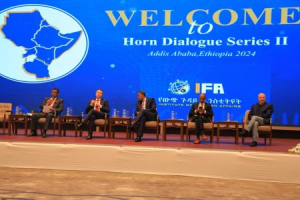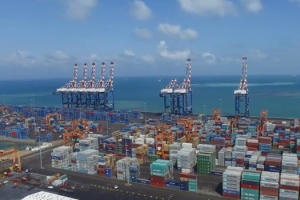
Historians, researchers and academics of all sorts from several countries have presented reports of the battle of Adwa where the invading Italian forces were defeated in a final battle that practically lasted half a day. A lot has been said and written about the background to the war, the immediate and remote causes of it and how Ethiopia, an unknown quantity by European standards, could fight a war against a European army and inflict a defeat.
Lots of admirations were given to the strategist of this battle Emperor Menelik II and his generals who counseled him in the long process of mobilizing all the fighting forces and organizing the way the battle should have been carried out. The contributions of the various warlords who stood immediately by the side of the Menelik army despite their disagreements on certain internal political issues were well mentioned in the history of the battle.
Ethiopians of all ages have been brought up listening to the war chants of their warriors who it was always underlined fought bravely barefooted and with little arms against the formidable European army to the testimonial of their bravery and their faith in their country, their willingness to pay whatever price in order to keep the flames of freedom always bright on the skies of Ethiopia. Ethiopians they were told always fought hard to keep the territorial integrity of their land and the sovereignty of their government on the motherland and that whatever differences and disputes there may be among Ethiopians, however, where the danger came from abroad with alien forces Ethiopians would immediately forget their differences for another day and unite against the enemy. This has been a constant in the history of Ethiopia and there was never a compromise on freedom and dignity whatever the cost may be.
The victory of Adwa just as other battles Ethiopians fought and won against their enemies which tried to penetrate their sovereign land again and again, have been taught in history lessons of the Ethiopian education system. But there are still many scholars who insist that not enough attention has been afforded to all the protagonists of the masterpiece and not everyone knows in detail what exactly happened when and how Adwa in the end materialized. For some it was just a myth and a casual event but for others who were well informed about the history of the battle, it was the turning point of not only Ethiopian history but also of Africa and the world.
It is also a turning point in the history of the world as well, in the history of the relationship between the mighty and the weak, the oppressors and the oppressed, and a victory for all those who have always condemned aggression and colonial expansion. With this victory Africa was in a way vindicated although it took decades before the first real liberation movements were formed and began to face head on colonial forces. All over Africa the flames of the victory of Adwa spread to inspire them to show that they too could emulate what Ethiopians did in 1896.
The story of Adwa has been repeatedly narrated in many places in African countries but not enough exposure has been afforded to African students about the real, true stories behind the victory of Adwa. Adwa is now considered as part of the historiography of Africa and the day the victory was recorded is to be marked at the continental level.
However, there are many scholars and observers of African history who say that the Victory of Adwa has not been repeated in the modern diplomatic world for Africa at large or even for Ethiopia, the owner of this huge historical legacy. In today’s world we all know what place Africa has and what it actually should be entitled to.
Africa represents a huge part of the world with a huge population but the economic share of the continent is insignificant and yet most of the raw materials for the industries of the world, particularly the west, derive from Africa with cheap African labour and small revenues from the sale of the ingredients. Africa may have had undemocratic regimes but we all know what contribution there is on the part of other countries outside Africa in things that happen in the continent.
African leaders have been many times complacent with the exploitation of their peoples and the blessings of the land in complicity with western forces in large part and the results have been the slow growth of the continent and the slow progress of its people. This means the spirit of Adwa has been betrayed because at Adwa all Ethiopians of all walks of life received the call of their emperor and united to fight together against the alien enemy, the alien force that threatened their sovereignty and dignity as well as pride. Adwa would never have materialized if it was not for the total unity of Ethiopians from all ethnic groups, religious origin and geographical location of the country. The commitment to stand in unison until the final sacrifice was the bond that Ethiopians had and that resulted in victory. This could have been repeated even in Africa if we were to follow the inspiration of Adwa.
Africans are seen divided on a number of internal issues and they continue to kill each other becoming at times Trojan horses for outside powers. They operate against their own peoples and divided they became weak and easy to deal with by enemies or rivals. The African Union, the replacement of the Organization of African Unity was intended not only to fight for the political liberation of Africa but also for its economic progress and place in the world at large. The AU has the goal of unifying really the continent not only economically but also politically in the long run, and more or less copy the footpaths of the European Union which has a European Parliament and other structures that work as one unit in the continent beside of course using the same currency, the Euro.
The EU has become a reality leaving aside bitter enmity and rivalry between many European countries and forgetting the years old of wars particularly in the two World Wars. European countries have shown us how to sacrifice certain feelings and revengeful attitudes when greater ends are on the horizon. Europe needed to have a big voice in the international landscape when they saw that the US, Russia and China were huge rivals in many respects, and united they could be ‘equal partners’ and make their voices heard. Similarly, Africa as well could have copied not only the spirit of Adwa but also the way the EU was formed and the good results it has been producing.
Unfortunately, Africa is still the forgotten continent and its destiny is shaped not by its own children or its governments but by outsiders, largely westerners. Many even dare say that Africa is not yet free if we talk about real sovereignty. The independence movements did secure flag independence but they are still largely dependent on their former masters and others even in deciding their fate. Africa cannot sit around a table and negotiate about its strategic interests. The world order of decades ago is still preventing Africans from having their adequate say in today’s world. The victory of Adwa has at all been replicated neither in Ethiopia nor even in the wider African continent at large.
Today the Security Council of the UN is still the domain of five nations who took part in World War II and decided the fate of the world at the end of the war. This veto system of the UNSC has damaged the interests of Africans and we have seen several times things being decided on the world level without consulting at all Africans. And yet Africa is not inferior to for example one nation such as France or England who have a permanent seat in the UNSC and decide on matters that affect more than a billion Africans without consulting them or independently of their feelings!
Africa is still relatively weak in political and economic matters when it comes to gauging its real position in the world. We may talk about the inspiration of the victory of Adwa as a victory of the oppressed on the oppressors but we can say that its spirit has been betrayed for one reason or another. Hence, Africans must wake up again and take lessons from battles such as Adwa where united any objective could be realized. What Africa needs to do is overcome its superficial differences or antagonisms motivated by old narratives and vendettas and focus on the big picture of a huge continent that deserves its right place in the world at large and Africans have the right to reap what they sow and reserve a better future for the coming generation.
Africans must show that they deserve better and fill the gap with the rest of the world in many ways. Africa must regain its dignity and pride and never be referred to as the undeveloped world when it has the means to defeat poverty once and for all. As long as Africa is poor it can never have the deserved place or say in the world at large, and that is where the spirit of Adwa should be called for as the way to beat any formidable enemy if done with commitment and unity, courage and bravery.
BY FITSUM GETACHEW
THE ETHIOPIAN HERALD SUNDAY EDITION 3 MARCH 2024





